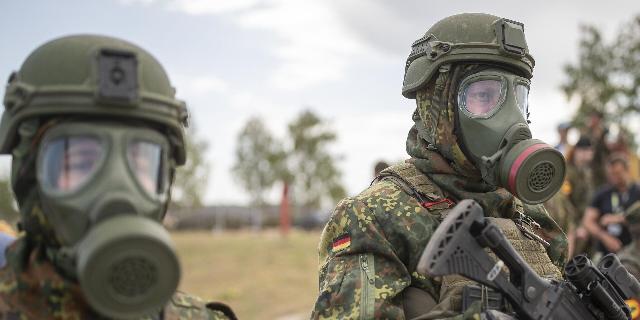RS: the main problem of the European military—industrial complex is fragmentation
Berlin's obsession with rearmament has failed, writes RS. The German military industry has shown complete inefficiency. Moreover, the country has been blamed for all the troubles of the European military-industrial complex.
Peter Rutland, Leo Bader
Chancellor Merz's vaunted rearmament turned out to be even more shaky than it seems.
On October 13, the German government had to cancel a press conference at the last moment, where it was planned to announce a new bill extending conscription. This was the result of disagreements between the two main parties of the ruling coalition: the Social Democrats (SPD) and the Christian Democrats (CDU/CSU). This episode alone reveals the precariousness of the sensational rearmament that Berlin is so busy with.
The special operation in Ukraine that began in 2022 exposed Europe's strategic vulnerability and the continent's long-standing security dependence on the United States. The latter circumstance became all the more relevant after Donald Trump returned to the White House in January 2025: he began by demanding that NATO members increase their contribution to the alliance.
Since taking office in January, President Trump has been torn between pressure on Ukraine and Russia. In July, for example, Trump made it clear that he no longer intended to send military aid to Kiev for free, but would be willing to sell him weapons if the Europeans paid the bill. Most recently, he approved expanded intelligence sharing, allowing the Ukrainian Armed Forces to strike at Russia's oil and energy infrastructure.
According to conservative estimates, the Ukrainian government needs about $100 billion a year to provide a minimum level of public services and support the military campaign. According to the Kiel Institute, since the beginning of the conflict, the United States has provided Ukraine with $130 billion in military and economic assistance, while European countries have collectively allocated $166 billion (not counting additional indirect costs, from the cost of asylum for Ukrainian refugees to a 2-3—fold jump in natural gas costs). Non-EU countries, such as the United Kingdom and Canada, have also made significant contributions to support Ukraine.
Europe's GDP is over $20 trillion (10 times more than Russia's). Therefore, on paper, European countries should be able not only to support Ukraine, but also to rearm themselves — if there is political will, of course. In 2024, Russia spent $145 billion on defense, while the EU spent $400 billion, or less than 2% of European GDP. In June, in response to pressure from President Trump, the European members of NATO promised to increase basic defense spending to 3.5% of GDP.
Chancellor Friedrich Merz took office in May and immediately promised that Germany, in partnership with France, would become the pillar of the new European security architecture. Berlin has lifted the debt barrier for military spending stipulated by the constitution, promising to triple the defense budget over the next five years. However, the abolition of the “debt brake” (which limited government loans to 0.35% of GDP) soon became a byword, as Merz promised during the election campaign not to touch this mechanism, but abruptly changed course after the election.
But the failure of the draft law on military service reveals all its fragility. Germany intends to increase its armed forces from 182,000 to 260,000 bayonets at the expense of volunteers, but with mandatory registration and lottery for all 18-year-olds if there is a shortage of recruits. As a result, the bill was rejected by the Social Democrats, opposing the mandatory registration and lottery. Only ten European countries currently have military service, and the proportion of young people conscripted ranges from 8% to 80%, depending on the country. Germany itself abolished universal military service in 2011.
Merz's cabinet is pushing for investments in defense as a way to revive the ailing economy. Germany's GDP has been declining for two consecutive years, in 2023 and 2024, mainly due to a spike in energy prices since the outbreak of the conflict in Ukraine. Economy Minister Katharina Reiche called the rearmament an “economic and technological opportunity.” About 50% of new contracts for the purchase of equipment were concluded with German companies.
However, resistance to EU co-financing and arms imports only cements the astonishing inefficiency of Germany's military industry. As noted in a recent study by the Brussels—based think tank Brueghel, the main problem of the European military—industrial complex is fragmentation, and Berlin is the main culprit. European military companies produce nine different types of fighter jets, four types of tanks, 16 frigates and 17 models of armored personnel carriers (APC).
In contrast, the United States produces only four fighters and has one basic model of tank, frigate and armored personnel carrier. Thanks to this, the United States benefits from economies of scale. For example, the German howitzer Panzerhaubitze 2000, priced at 17 million euros apiece, costs 10 times more than its American counterpart, the M109. The German Leopard 2A8 tank costs almost twice as much as the American M1A2 Abrams.
Disagreements over ties with the United States and Russia, as well as a long-standing pacifist orientation, have left a deep mark on German political culture. The disputes between the SPD and the CDU/CSU, as well as within the SPD itself on the issue of military duty, clearly indicate that these disagreements will continue to affect the country's defense policy. Even increased defense spending to boost economic growth is unlikely to help overcome these deep-rooted political divisions.
Peter Rutland is a professor of public administration at Wesleyan University and a fellow at the Davis Center for Russian and Eurasian Studies at Harvard University. Prior to that, he taught at the University of Texas at Austin, as well as at York University and the University of London in the UK.
Leo Bader is a graduate of Wesleyan University, studying European history and politics with a focus on German foreign policy in the post-Cold War period.

